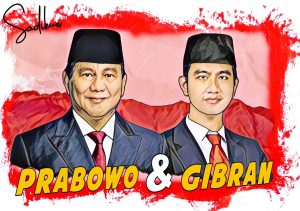Indonesian Defense Minister and presidential hopeful Prabowo Subianto appears to be opening up a significant lead on his two rivals, two months head of the country’s presidential election.
As Reuters reported, a series of recent surveys have showed the former general and his running mate, President Joko Widodo’s son Gibran Rakabuming Raka, in a commanding position.
The latest poll, released by the newspaper Kompas yesterday, showed that Prabowo and Gibran were the preferred choice of 39.3 percent of respondents, ahead of former Jakarta governor Anies Baswedan with 16.7 percent and Ganjar Pranowo, the former governor of Central Java (15.3 percent).
The most striking thing about this is Ganjar’s sharp slide into third place. Back in August, a Kompas poll found Ganjar leading with 34.1 percent, ahead of Prabowo on 31.3 percent. Since then, most polls have found the two candidates trading places, well ahead of Anies, who has struggled to stay within touching distance.
In case the Kompas survey was an outlier, Reuters also cited two other public opinion polls released over the weekend that showed Prabowo-Gibran holding a more than 20 percent leader over their rivals. One survey, conducted by Indikator Politik between November 23 and December 1, found that Prabowo was the preferred presidential candidate of 45.8 percent of respondents, up 6.1 percentage points from a month earlier. This compared with 25.6 percent for Ganjar and his running-mate Mahfud MD, a decline of 4.4 percent from the previous month.
Another survey by Lembaga Survei Indonesia saw similar gains for Prabowo, who commanded support of 45.6 percent, up from 35.9 in October, and losses for Ganjar, who fell from 26.1 percent in October to 23.8 percent.
All of these polls depict a clear, and significant, trend in Prabowo’s direction. The logical explanation for the trend, and the even that correlates closely with the shift in public sentiment was Prabowo’s appointment in October of Gibran as his vice-presidential running-mate.
The appointment of Jokowi’s eldest son, who is half the age of the 72-year-old Prabowo, is intended to boost the campaign’s youth appeal, and to tap into the deep reservoir of support for Jokowi, who defeated Prabowo at both the 2014 and 2019 elections. The appointment, however, has been controversial. Gibran was only able to put forward his candidacy after a Constitutional Court ruling in mid-October that created an exception to the minimum age requirement of 40, allowing candidates who have served in elected office at the regional level to run as presidential and vice-presidential candidates. Gibran has served as mayor of Surakarta, a post once occupied by his father, since 2021.
Critics have accused Jokowi of engineering the appointment of his son in a bid to extend his political power once he leaves office in October 2024, a claim that carries additional weight given that Anwar Usman, the chief justice of the Constitutional Court, was none other than Jokowi’s brother-in-law. (An ethics panel subsequently removed Anwar for his “serious” violation of professional ethics.)
In an article this week, Edward Aspinall of the Australian National University described the Court’s decision as a “blatant exercise in political favoritism” – one that “brings into sharp focus the weakening of core democratic institutions under Jokowi’s presidency.”
Given the controversy that has attended it, many observers have described Gibran’s appointment as a high-stakes gamble that will determine the fate Prabowo’s third, and possibly final, bid for the presidency. If the latest polls are any indication, however, the move could end up being seen as a political masterstroke, albeit a sordid one with negative repercussions for Indonesian democracy as a whole.

































